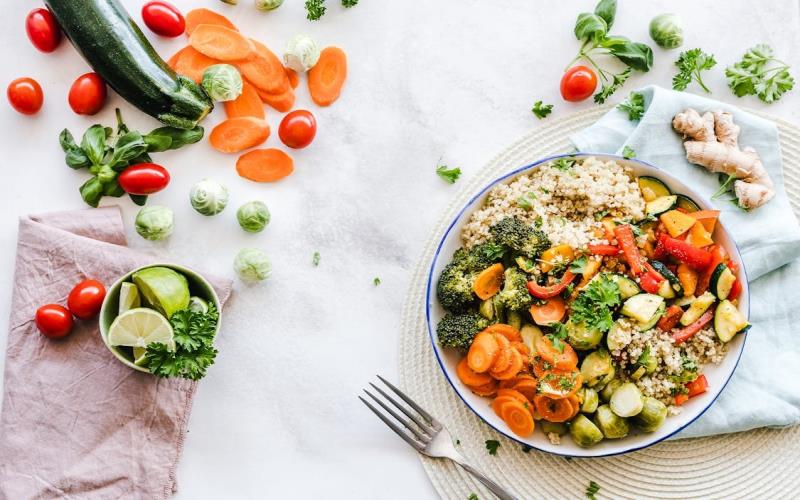You might not notice it until you’re ill, but your immune system works day in and day out to fight off bugs and keep you healthy. All that work takes effort, though, and just like the rest of you, your immune system needs vitamins and minerals to do its job properly.
In this article, we’re looking at 10 top tips and habits you can use to keep your immune system strong and healthy so it can do the same for you.
Eat a Varied and Balanced Diet
The first thing you can do to keep your immune system strong and healthy is to get enough vitamins and minerals. The best way to do this is to get a varied and balanced diet.
First, you’ll want to ensure plenty of fruit and vegetables. As a rule of thumb, the more colourful your plate, the better. Aim for at least five portions of fruit and veg a day.
You’ll also want to get in a good mixture of seeds, nuts, beans, and maybe even some eggs and fish, depending on your diet preferences. Let’s look at where you can get some of the crucial vitamins and minerals your immune system needs to stay strong.
- Vitamin A: Found in dark leafy vegetables like kale and spinach, milk, cheese, liver, and orange fruits and vegetables like sweet potatoes, carrots, and, of course, oranges.
- B vitamins: Found in fish, meat, poultry, and eggs, as well as leafy vegetables and beans.
- Vitamin C: Found in fruit and vegetables, including citrus fruit, fruit juices, strawberries and blackcurrants, broccoli and Brussels sprouts, peppers, and tomatoes.
- Iron: Found in green vegetables, red meat, beans, and dried fruit.
- Selenium: Found in nuts and seeds, grains, fish and shellfish.
- Zinc: Found in meat, fish, eggs, cheese, wholegrain cereals, and root vegetables.
Cut Down on Fatty and Sugary Foods
While eating plenty of vegetables is good for you, the same can’t be said of all foods: Diets high in saturated fats and sugars can harm your immune system.
Fatty and sugary foods, or even eating too many calories in general, increase your blood sugar levels, which increases oxidants, damaging your cells and inhibiting your immune system.
Some foods you should try to avoid and only eat in moderation include:
Sugary foods
- Sweets and Chocolates
- Baked goods, like cakes and biscuits
- Sweetened drinks, like fizzy pop and milkshakes
- Sugar in tea and coffee
- Desserts, including ice cream
Foods with Saturated Fats
- Fatty cuts of meat and meat products like sausages and pies
- Butter, ghee and lard
- Cheese, especially hard cheeses
- Cream and ice cream
- Crisps
- Chocolate
- Biscuits and cakes and pastries
- Coconut oil and cream
Only Drink Alcohol in Moderation
Excessive drinking has a lot of adverse effects on your body, and one of those is to weaken your immune system and impair the function of your immune cells. It also makes you more prone to infection by decreasing blood flow and putting extra strain on your lungs and liver, which are all essential for a properly functioning immune system.
So, if you drink, try to do so in moderation, ideally consuming no more than 14 units per week, spread across three or more days. That’s about six pints of beer or glasses of wine per week.
Spice Up Your Life with Antioxidant-Rich Foods
Herbs and spices are great for adding a little flavour to your dishes. However, they can also be fantastic, providing your body and immune system with antioxidants that help neutralise harmful chemicals.
Try adding spices like ginger, turmeric, allspice, cinnamon and saffron to dishes to give them an extra flavourful antioxidant boost. Garlic is also a great way to liven up dishes while boosting your immune system.
Many herbs are fantastic for you, too and are high in helpful antioxidants. These include oregano, thyme, sage, rosemary and parsley.
Conclusion
They say, ‘You are what you eat’, which is as true for your immune system as it is for the rest of you. Eat a healthy diet, and you’ll be well on your way to having a strong immune system that can fend off bugs and keep you fighting fit.
They also say, ‘An apple a day keeps the doctor away.’ We’d definitely recommend more fruit and vegetables, so that’s pretty good advice, too. However, if you’re worried about your health and would like more advice, you can always speak to your GP or book in for a private online doctor appointment if you’re pressed for time and would prefer to get support from your own home. They’ll be more than happy to give you the help you need to stay healthy.

